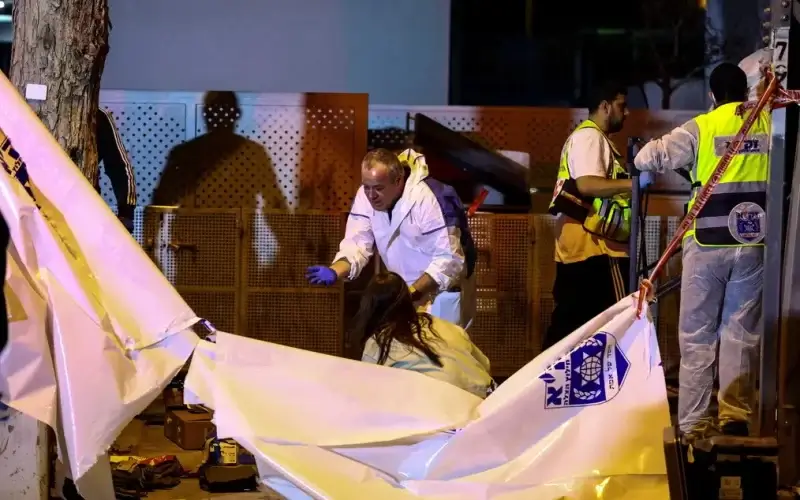A series of terror attacks in Israel this week perpetrated by Islamic extremist terrorists seems to be the work of the Islamic State which has been expanding its influence throughout the Jewish State.
There were eleven real murders in Israel just in the last week. Two attacks have been claimed directly by ISIS, and one is too early to tell.
The Islamic State claimed credit in a video released Sunday for the terrorist attack in Hadera, Israel which killed two Israeli border police officers and wounded a dozen civilians. In the same video, ISIS also claimed responsibility for last week’s terrorist attack in Beersheba.
Previously it was reported that the Beersheba attacker had ISIS connections, but the terror group did not initially claim the attack. Tuesday, a Palestinian man shot and killed five more Israelis near Tel Aviv.
“We are talking about terrorists belonging to the Islamic State, said Israeli security minister Omer Bar-Lev. We are witnessing an alarming awakening, that could happen in any country,” Bar-Lev said.
However, some analysts believe that ISIS does not intend to focus its efforts on taking lives in Israel. Instead, opportunistically claiming high-profile, low-cost attacks helps boost morale and recruiting efforts.
Since all four terrorists from the last week’s attacks were killed during their assaults, ongoing investigations will have to reveal more. The relatively simple nature of the attacks could point to either attacks that ISIS directed to occur off -the-cuff, or relatively amateur attacks by fervent local extremists that ISIS decided to take advantage of by claiming.
Since America declared ISIS defeated in 2019, ISIS may need some high-profile attacks to get back on the front page and remind potential recruits that it is still out there.
Today, the Islamic State of Iraq and Syria is no longer limited to its title countries. ISIS operations have spread to countries all over the Middle East, from Lebanon and Pakistan to Afghanistan, where ISIS and the ruling Taliban are rivals.
One of the main things ISIS has in common with other terrorist groups such as Hamas, Al Qaeda, Hezbollah, the Iranian Revolutionary Guard Corps, and the Syrian government is they frequently and fervently call for the annihilation of the state of Israel, and indeed all Jewish people. But they do have different priorities, which cause them to clash and explains why state-sponsored terror groups with political interests can be targeted by ISIS.
ISIS hoped to transcend factions by pushing absolutist ideological platforms and demanding purity from other Muslims. For example, their priorities clash with those of the Taliban, which is now trying to govern a country and not just its own tactical operations. Government bureaucracy is not a very holy undertaking.
To this point, some analysts say ISIS focuses on facing the ‘near enemy,” that is, Muslims who are not pure enough, rather than the ‘far enemy,’ which are ‘infidels’ like Jews or America - obviously not part of the Islamist cause. Al Qaeda, for example, launched the worst attack so far on the ‘far enemy’ with the September 11, 2001 attacks.
So this view posits that when ISIS threatens the existence of Israel and vows to wipe out Jews, it does so for propaganda purposes, not because it wants to target Israel in actions. In railing against Israel, ISIS hopes to gather more adherents but it actually plans to continue the majority of its operations in the Middle East against other Muslims it wants to control.
The last time ISIS claimed a terror attack in Israel was June 2017. But neither Israeli security forces nor Hamas believed that ISIS actually directed the attack.
Israel said the 2017 attackers, three young Palestinian men, made up a “classic local cell.” Hamas, wanting to gain some clout from the attack, said the attackers were members of a local Palestinian terrorist group.
Like the attackers in 2017, all four attackers from this month were Arab Israelis or Palestinians. The timing of the attacks could provide some insight to their inspiration if it wasn’t prodding by ISIS.
The Hadera attack on Sunday occurred during the Negev Summit, where diplomats from Bahrain, Egypt, Morocco, the United Arab Emirates, and the United States met with the goal of presenting a united front against Iran. For the foreign ministers of Bahrain, the UAE, and Morocco, the diplomatic trip to Israel was a first. The unity among these diverse states could provide a motive for local cells to act out, or it could provide a motive for ISIS to punish Muslim state leaders for sitting down with ‘infidels.’
Additionally, the weeks leading up to and during Ramadan each year have marked an increase in terror attacks, as terrorist leaders hype religious fervor during the holiest month for Muslims. Hezbollah in Lebanon, Iran’s Revolutionary Guard Corps, Hamas, and the Palestinian Islamic Jihad terrorist movement all praised this month’s terrorist attacks in Israel as heroic.
It is worth noting that ISIS has gained a reputation of avoiding direct attacks on Israel, with one Western journalist reporting that Israel had the only military that ISIS fighters were actually afraid of. ISIS reportedly apologized after shooting at Israeli Defense Forces in late 2016. Claiming an attack that killed two Israeli border police officers seems to be a change of course.









